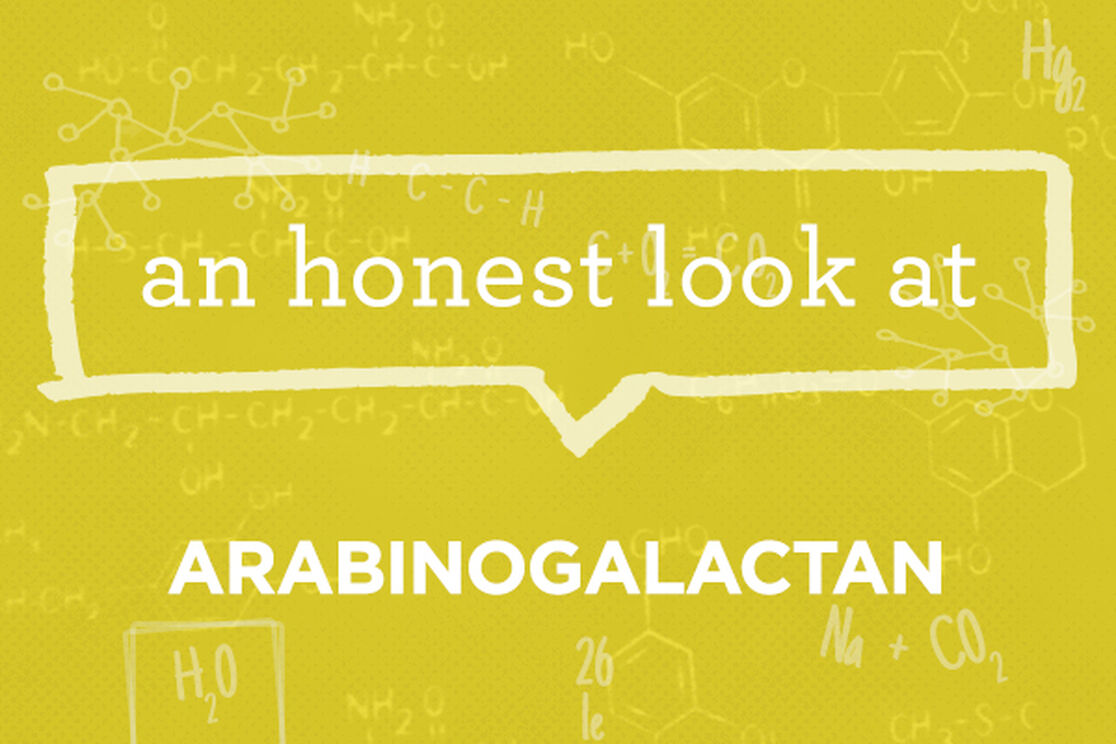This is part of our ongoing series helping consumers better understand chemicals, chemistry, and product formulations. We translate the science, bust the myths, and give you an honest assessment, so you can make informed choices for your family!
Ingredient:
Arabinogalactan
What it is:
Arabinogalactan (AG) is a polysaccharide (a chain of sugar molecules) found in a wide range of foods like carrots, radishes, wheat, Shiitake mushrooms, and coconuts, as well as plants like Echinacea purpurea and Thuja occidentalis. For commercial products, AG is most commonly sourced from Larch trees (which have a very high concentration of the substance) using an eco-friendly, hot water extraction process.
What it does:
Arabinogalactan is a relatively new darling in the world of nutraceuticals (it’s been “new” for the past 20 years), and a rich body of research shows the many benefits of Arabinogalactan:
- Helps build a more responsive immune system
- Supports monocyte production in the mononuclear portion of the immune system, one of the first lines of defense against foreign invaders
- Decreases the incidence of common cold
- Functions as a prebiotic and significantly enhances beneficial gut microflora, specifically increasing anaerobes such as Bifidobacteria and Lactobacillus, while decreasing harmful Clostridia
- Increases short chain fatty acid (SCFA) production, decreases ammonia generation, and lowers the colon pH, which is thought to play a role in the protection against a variety of gastrointestinal diseases
- Stimulates natural killer (NK) cell cytotoxicity which aids in fighting viruses and tumors
Why we use it:
It’s true: not all sugars are bad for you! Arabinogalactan is one of the key ingredients in both our Kid’s Immunity Boost and our Immunity Defense Health + Wellness products. Not only does it have amazing immune boosting powers, it’s also 100% water soluble and has a very mild taste, making it easy to digest and subtly flavor your child’s favorite food (yogurt, oatmeal, jelly sandwich, etc.), smoothie, or milk choice.
Why we’re featuring it today:
The U.S. Food and Drug Administration does not require supplement manufacturers to prove that their products do what they say they’re going to do. The more you know, the more you might question whether or not it’s worth it to invest your hard-earned money into these types of products - rightly so!
We appreciate that, so that’s why we (and our renowned team of expert Medical Advisors) do enormous amounts of research as we develop our products. We’re also vigilantly ensuring our formulas keep up with our ever-evolving scientific understanding of the human body.
We get our fair share of questions from people wondering what kind of evidence we have for our formulations and this blog series is one way we can share that with you. See the list of references below for a sampling of the peer-reviewed research conducted on arabinogalactan that have guided our decision-making.
Still have questions about arabinogalactan? Let us know in the comments and we’ll do our best to find you an answer!
References:
- Benedikt, H. (1999). Arabinogalactans: New immune boosting fiber. Natural Pharmacy, 3(6).
- Beuth, J., Ko, H. L., Oette, K., Pulverer, G., Roszkowski, K., & Uhlenbruck, G. (1987). Inhibition of liver metastasis in mice by blocking hepatocyte lectins with arabinogalactan infusions and D-galactose. Journal of cancer research and clinical oncology, 113(1), 51-55.
- Beuth J, Ko HL, Schirrmacher V, Uhlenbruck G, Pulverer G. (1988) Inhibition of liver tumor cell colonization in two animal tumor models by lectin blocking with D-galactose or arabinogalactan. Clin Exp Metastasis, 6:115-120.
- Classen B, Thude S, Blaschek W, Wack M, Bodinet C: Immunomodulatory effects of arabinogalactan-proteins from Baptisia and Echinacea. Phytomedicine 2006, 13:688-694.
- Currier NL, Lejtenyi D, Miller SC: Effect over time of in-vivo administration of the polysaccharide arabinogalactan on immune and hemopoietic cell lineages in murine spleen and bone marrow. Phytomedicine 2003, 10:145-153.
- D’Adamo P: Larch Arabinogalactan is a Novel Immune Modulator. J Naturopath Med 1996, 4:32-39.
- Grieshop CM, Flickinger EA, Fahey GC Jr: Oral administration of arabinogalactan affects immune status and fecal microbial populations in dogs. J Nutr 2002, 132:478-482.
- Fitzpatrick, A., Roberts, A. L. A. N., & Witherly, S. T. E. V. E. N. (2004). Larch arabinogalactan: A novel and multifunctional natural product. AGRO FOOD INDUSTRY HI TECH, 15(1), 30-32.
- Kelly, G. S. (1999). Larch arabinogalactan: clinical relevance of a novel immune-enhancing polysaccharide. Alternative medicine review: a journal of clinical therapeutic, 4(2), 96-103.
- Luettig B, Steinmuller C, Gifford GE, Wagner H, Lohmann-Matthes ML: Macrophage activation by the polysaccharide arabinogalactan isolated from plant cell cultures of Echinacea purpurea. J Natl Cancer Inst 1989, 81:669-675.
- Riede, L., Grube, B., & Gruenwald, J. (2013). Larch arabinogalactan effects on reducing incidence of upper respiratory infections. Current Medical Research & Opinion, 29(3), 251-258.
- Roxas M, Jurenka J: Colds and influenza: a review of diagnosis and conventional, botanical, and nutritional considerations. Altern Med Rev 2007, 12:25-48.
We aim to provide you with the most honest and credible information possible. This article was reviewed for accuracy by The Honest Team and its internal technical experts.
blog_review_statement



